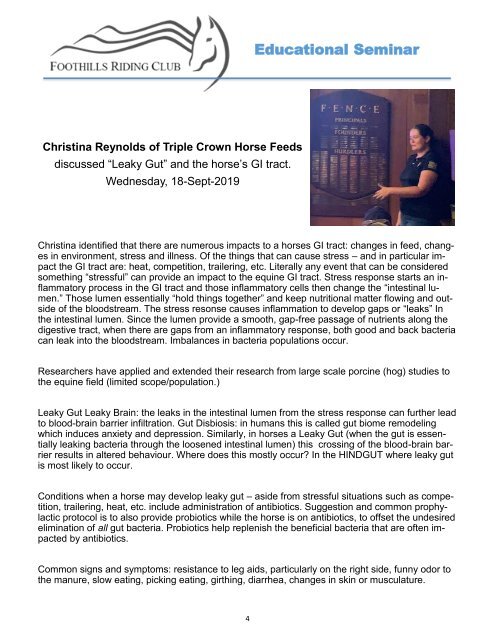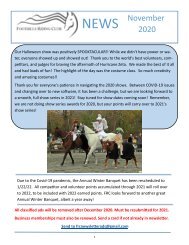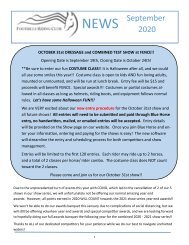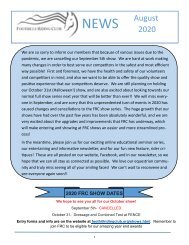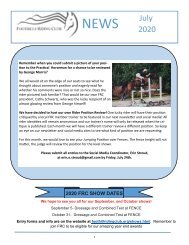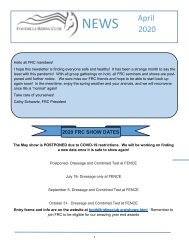October 2019 FRC Member Newsletter
You also want an ePaper? Increase the reach of your titles
YUMPU automatically turns print PDFs into web optimized ePapers that Google loves.
Educational Seminar<br />
Christina Reynolds of Triple Crown Horse Feeds<br />
discussed “Leaky Gut” and the horse’s GI tract.<br />
Wednesday, 18-Sept-<strong>2019</strong><br />
Christina identified that there are numerous impacts to a horses GI tract: changes in feed, changes<br />
in environment, stress and illness. Of the things that can cause stress – and in particular impact<br />
the GI tract are: heat, competition, trailering, etc. Literally any event that can be considered<br />
something “stressful” can provide an impact to the equine GI tract. Stress response starts an inflammatory<br />
process in the GI tract and those inflammatory cells then change the “intestinal lumen.”<br />
Those lumen essentially “hold things together” and keep nutritional matter flowing and outside<br />
of the bloodstream. The stress resonse causes inflammation to develop gaps or “leaks” In<br />
the intestinal lumen. Since the lumen provide a smooth, gap-free passage of nutrients along the<br />
digestive tract, when there are gaps from an inflammatory response, both good and back bacteria<br />
can leak into the bloodstream. Imbalances in bacteria populations occur.<br />
Researchers have applied and extended their research from large scale porcine (hog) studies to<br />
the equine field (limited scope/population.)<br />
Leaky Gut Leaky Brain: the leaks in the intestinal lumen from the stress response can further lead<br />
to blood-brain barrier infiltration. Gut Disbiosis: in humans this is called gut biome remodeling<br />
which induces anxiety and depression. Similarly, in horses a Leaky Gut (when the gut is essentially<br />
leaking bacteria through the loosened intestinal lumen) this crossing of the blood-brain barrier<br />
results in altered behaviour. Where does this mostly occur? In the HINDGUT where leaky gut<br />
is most likely to occur.<br />
Conditions when a horse may develop leaky gut – aside from stressful situations such as competition,<br />
trailering, heat, etc. include administration of antibiotics. Suggestion and common prophylactic<br />
protocol is to also provide probiotics while the horse is on antibiotics, to offset the undesired<br />
elimination of all gut bacteria. Probiotics help replenish the beneficial bacteria that are often impacted<br />
by antibiotics.<br />
Common signs and symptoms: resistance to leg aids, particularly on the right side, funny odor to<br />
the manure, slow eating, picking eating, girthing, diarrhea, changes in skin or musculature.<br />
4


